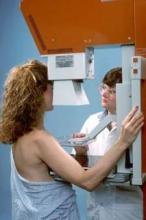About a quarter of women with dense breasts are at high risk for interval cancer, so mandating supplemental or alternative screening methods for all such women is not justified, according to a report published May 18 in Annals of Internal Medicine.
Twenty-one states currently have some type of breast density notification law, with most requiring that women be informed if their breasts are heterogeneously or extremely dense on screening digital mammography and suggesting that they discuss the need for supplemental imaging with their health care providers. To assess the real-world risk of interval cancers in women with dense breasts, the researchers analyzed 831,455 digital screening mammographies performed from January 2002 through October 2011 on 365,426 women across the country who were aged 40-74 years and whose medical records included complete demographic and breast health information.
Overall, 47% of the study participants had extremely dense or heterogeneously dense breasts. A total of 2,696 of these women were diagnosed as having invasive breast cancer within 1 year of undergoing screening mammography, according to Dr. Karla Kerlikowske of the University of California, San Francisco, and the San Francisco Veterans Affairs Medical Center, and her associates.
The researchers observed interval cancer rates greater than 1 case per 1,000 mammography exams among 24% of women aged 40-74 years with dense breasts. The 5-year risk was categorized as low to average for 51.0% of those with heterogeneously dense breasts and 52.5% of those with extremely dense breasts, with interval cancer rates of 0.58 to 0.63 and 0.72 to 0.89 case per 1,000 mammography examinations, respectively (Ann. Intern. Med. 2015 May 18 [doi:10.7326/M14-1465]).
Breast density alone was not a good predictor of interval cancer risk. Other factors, such as patient age, race and ethnicity, and family history, should be combined with breast density to determine whether supplemental or alternative imaging is warranted, the investigators wrote.
“Digital mammography has sufficiently high breast cancer detection and reasonably low rates of false-positive results for routine use, even among women with dense breasts,” Dr. Kerlikowske and her associates wrote.
The study was funded primarily by the National Cancer Institute, as well as by many state public health departments and cancer registries. One of the authors reported being a consultant for GE and Bayer and receiving grants or having pending grants from GE.


